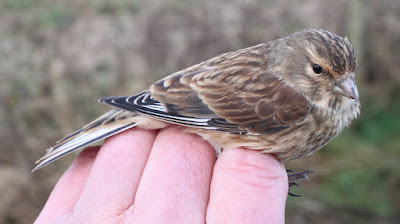At last a slightly better morning with a hint of sunshine. There was no rain but too breezy to plan a ringing session, so it was birding for me.
With these 0800 late starts there’s always traffic about. Near Hambleton I spotted a Barn Owl sat on the roadside fence. But on a single track road where “white van man” was closing fast in the rear view mirror there was no option but to sail past the owl. I stopped at a pull off point 50 yards away just in time to see the owl fly over the tall hedge and off towards its daytime roost in a broken down old building. I consoled myself with the thought that the owl was so close to the road that had I stopped it would have flown off anyway. It’s the same location where I saw Barn Owls a number of times in the summer and autumn.
Barn Owl
I stopped at Pilling to check on the Linnets where if the wind speed will drop we hope for a ringing session before weekend. There are still plenty of Linnets to go at with 200/240 flying around the plot this morning. Nearby a Buzzard sat atop a pole while taking a close interest in goings on below.
Buzzard
Near the farm at the head of the lane there was a Kestrel, one of four I saw this morning at Stalmine, Pilling (2), and then Cockerham. I’m hoping that these possible incomers can replace the Kestrels we appeared to lose this year. Kestrels are partially migratory and dispersive whereby young ones move from their birth areas and in their second and subsequent years may breed many miles from their initial home.
Kestrel
I stopped in the gateway of Braides Farm and scanned the distant flood and the many birds thereon. It’s worth spending an hour more here as there is a constant movement of wildfowl and waders arriving, leaving or simply flying around after being spooked for a not always obvious reason. This morning : 500+ Lapwing, 190 Curlew, 80 Black-tailed Godwit, 60 Redshank, 75 Teal, 24 Wigeon and 22 Shoveler.
I spoke to a wildfowler coming off the marsh about the comings and goings of the geese and wildfowl. Like many wildfowlers he was very knowledgeable and he told me of his sighting of a Grey Phalarope as recently as 8th December. I had no reason to doubt his claim, especially when he described how he watched the bird from 10ft away.
The Grey Phalarope is a truly pelagic species and it spends up to 11 months of the year at sea, only coming to land to nest. The migration route of Canadian and Greenland birds takes them past Britain and Ireland, but normally well out to sea. Here in North West England it is a rare passage migrant, usually after Atlantic depressions that bring strong westerly or north-westerly winds towards the western side of Britain. There are approximately 500 records of this species in the UK each year and when they turn up, they are invariably highly approachable.
Grey Phalarope - Phalaropus lobatus-
Photo credit: Drbrown1970 via Foter.com / CC BY-NC-SA
I made my way to Conder Green where my beginner’s mistake of not keeping an eye on recent tide levels meant that the creeks were full of water from the rising tide of the River Lune.
Conder Green at high tide
So a somewhat different and reduced species count for here of 230 Teal, 45 Wigeon, 16 Snipe, 22 Redshank, 1 Spotted Redshank, 4 Little Grebe, 2 Shelduck. Fifteen Whooper Swans flew to the outer marsh and 5 Fieldfare were feeding in the near hedgerow.
Around the lanes of Jeremy and Moss I noted a hundred or more Fieldfares feeding in the wet fields and also noted that many hawthorns are quickly losing their berry crop.
Fieldfare
It’s about this time of year that Fieldfares turn from feeding on hedgerow berries to searching fields for earthworms. Or they may even appear in urban or suburban gardens, as one did this week in my own garden where it found the laden crab apple tree planted some 10 years ago and which until now has been mostly neglected by garden birds.
Look in again soon. There might be pictures of that Fieldfare and if Andy I get to Pilling, a Linnet or two.

















































.jpeg)


















